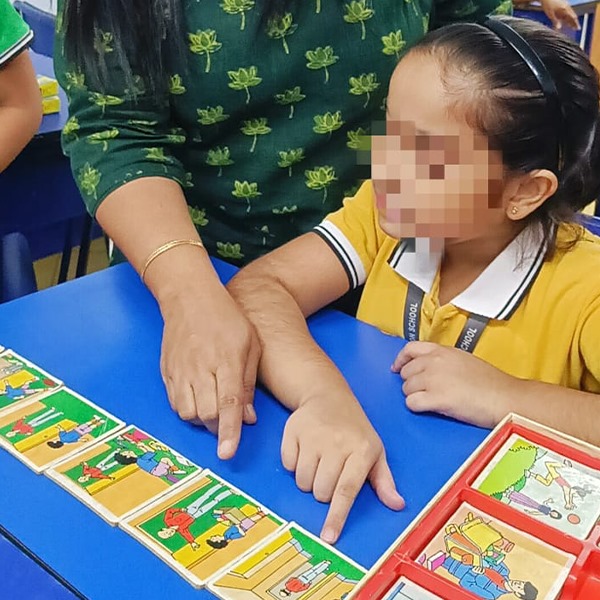“ All inclusion begins with acceptance from the heart “
And The Future Foundation School has been working towards reaching out to children irrespective of their academic, intellectual and physical differences to the best of their capacities. So that,
No Child is left behind.
Inclusive education is the most effective way to give all children a fair chance to go to school, learn and develop the skills they need to thrive. Inclusive education means all children in the same classrooms, in the same schools.
Inclusive education provides the least restrictive environment for challenged learners where they can easily share their views with other children and can participate in all activities . As a result, it aids in the development of confidence in such students.
The NEP also recognizes the importance of creating enabling mechanisms for providing Children With Special Needs (CWSN) or Divyang, the same opportunities of obtaining quality education as any other child.
Promoting inclusive education and diversity in schools can help to foster empathy and understanding among students, which is critical for creating a more inclusive and tolerant society.
The Future Foundation School has come forward to enrich the lives and learnings of children with individual differences in the following ways-
1. Classroom Observation-
The Special Educator observes children in classroom situations in the presence of mainstream teachers. Hence, Special Educators and mainstream
teachers work in collaboration to identify the needs and challenges of children with differences in classroom situations.
2. Physical infrastructure –
The school provides a barrier free environment to the students (like lifts). It is not only restricted to physical structure but also goes beyond, like, instruction, content and attitude.
3. Sensitisation workshops –
Awareness programmes and workshops for mainstream teachers are conducted in school. These workshops help teachers to identify the difficulties of these children and intervene accordingly.
4. Provisions in the curriculum–
These are made to raise and inculcate awareness and respect for differences . Differentiating and modifying teaching-learning materials are also done (instructions, assignments and assessments) to suit learners’ individual needs. Lessons are designed keeping in mind that ‘ every child learns differently’. Hence provisions to cater to different kinds of ‘intelligences’ are made so that each child learns according to his / her special area of strength. Assessments are designed so that there is a scope to accommodate children with special needs who require additional support.
5. Sensitisation of parents-
Parents are sensitised by psychological counsellor and Special Educator on the particular issues or difficulties faced by their children in school as well as classroom situations.
6. Skill Building Classes-
These classes are conducted for children having individual differences. The classes are designed to cater to the specific difficulties of the children. Based on the ability of the children they are provided intervention either in groups or following an Individualised Educational plan. Long term and short term goals are set according to their deficient skills.
7. SpEd classes –
The Future Foundation School has also teamed up with SpEd@School , an organisation with special interventions for students having differential needs . SpEd@school’s Learning Management System (LMS) has been curated specifically to meet the requirements of children aged 6-13, while helping the children achieve foundational literacy and numeracy. The learning management system provides a scalable solution, personalised approach, and content delivery mechanism through artificial intelligence for effective results in every child. A detailed study of the child’s needs and deficiencies are made to create intuitive worksheets to help the child meet the Learning Outcomes
These are made to raise and inculcate awareness and respect for differences . Differentiating and modifying teaching-learning materials are also done (instructions, assignments and assessments) to suit learners’ individual needs. Lessons are designed keeping in mind that ‘ every child learns differently’. Hence provisions to cater to different kinds of ‘intelligences’ are made so that each child learns according to his / her special area of strength. Assessments are designed so that there is a scope to accommodate children with special needs who require additional support.
5. Sensitisation of parents-
Parents are sensitised by psychological counsellor and Special Educator on the particular issues or difficulties faced by their children in school as well as classroom situations.
6. Skill Building Classes-
These classes are conducted for children having individual differences. The classes are designed to cater to the specific difficulties of the children. Based on the ability of the children they are provided intervention either in groups or following an Individualised Educational plan. Long term and short term goals are set according to their deficient skills.
7. SpEd classes –
The Future Foundation School has also teamed up with SpEd@School , an organisation with special interventions for students having differential needs . SpEd@school’s Learning Management System (LMS) has been curated specifically to meet the requirements of children aged 6-13, while helping the children achieve foundational literacy and numeracy. The learning management system provides a scalable solution, personalised approach, and content delivery mechanism through artificial intelligence for effective results in every child. A detailed study of the child’s needs and deficiencies are made to create intuitive worksheets to help the child meet the Learning Outcomes




